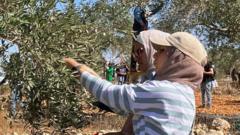The Struggle of Palestinian Olive Harvesting: A Story of Survival and Resistance
In the occupied West Bank, Palestinian olive farmers are facing unprecedented challenges during their annual olive harvest. The tragic story of Hanan Abu Salameh, a 59-year-old woman shot and killed by an Israeli soldier while gathering olives on her family’s land, symbolizes the growing dangers faced by Palestinian farmers.
Olive harvesting, a centuries-old tradition and critical economic activity, has become increasingly precarious. According to the UN, farmers across the West Bank are confronting multiple obstacles, including organized attacks by Israeli settlers and restrictions imposed by Israeli security forces.
Omar Tanatara, a farmer from Umm Safa, recounts last year’s difficulties, where they were barely able to harvest their olives. In some instances, soldiers destroyed gathered olives and ordered farmers to leave, while some farmers were shot at and had their olive trees deliberately cut down.
Even international and Israeli peace activists providing support cannot guarantee farmers’ safety. Zuraya Hadad, an Israeli peace activist, was brutally assaulted while helping Palestinian farmers, with Israeli soldiers doing little to protect her or intervene.
The olive industry is crucial to the Palestinian economy. In a good year, olives can be worth more than $70 million. However, recent challenges have significantly impacted production. Abd al-Rahman Khalifa, a factory owner, explains that the economic dependence on olives is similar to how Gulf countries rely on oil.
The situation has been exacerbated by political developments, particularly the actions of far-right Israeli ministers like Itamar Ben-Gvir. As national security minister, he has distributed firearms to settlers and encouraged them to assert their claim to what they consider “God-given” land.
The UN reports that over 96,000 dunums (approximately 96 sq km) of olive groves went uncultivated in 2023 due to Israeli access restrictions. Hundreds of trees have been burned or cut down, devastating local communities.
Specific incidents highlight the escalating tensions. Zvi Bar Yosef, a settler with an illegal outpost near Umm Safa, has been sanctioned by Western governments for repeated violent acts against Palestinians, including threatening families at gunpoint.
For Palestinians, olive trees represent more than an economic resource; they are a profound symbol of connection to the land. Generations have cultivated these trees, viewing them as a link to their heritage and identity.
As farmers continue to harvest what they can, the future remains uncertain. The ongoing conflict and increasing restrictions threaten not just an agricultural practice, but a fundamental aspect of Palestinian cultural and economic survival.
The olive tree, once a symbol of peace and resilience, now stands as a testament to the ongoing struggle for land, livelihood, and dignity in the occupied West Bank.




